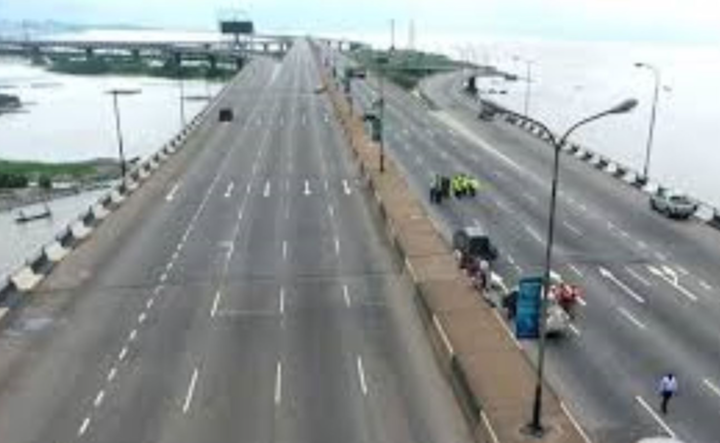The Minister of Works, Dave Umahi, has expressed grave concerns about the ongoing asphalt overlay work on the Third Mainland Bridge in Lagos. He has described this practice as dangerous and has raised alarms regarding the potential for vehicles to overturn due to the excessive thickness of the asphalt layer.
The Third Mainland Bridge, a critical transport artery in Lagos, had been scheduled for emergency repairs due to the deteriorating state of some portions of the bridge, marked by significant bumps that had become a serious cause for concern. Minister Dave Umahi made these revelations during an appearance on a Channels Television program, Politics Today.
The Minister’s observations pointed to a significant deviation from the bridge’s original design specifications. He explained that the bridge was initially intended to accommodate a two-inch overlay of asphalt, which is a standard design consideration for road engineering. However, over the years, as maintenance work was carried out, successive layers of asphalt were added to various portions of the bridge, resulting in an asphalt thickness that varies between four and twelve inches. This substantial increase in asphalt thickness creates a “superelevation,” which can be perilous for vehicles traversing the bridge, potentially leading to accidents, including overturning.

In the words of Minister Umahi, “You see, each carriageway of the Third Mainland Bridge is 14 meters, which means that each carriageway is two standard carriageways. So, we are dealing with 14 carriageways. What has happened is that in engineering design, there is what is called a dead load, and the asphalt is a dead load. What that bridge [design] is meant to carry is two inches of overlay asphalt.”
The minister’s statement raises important questions about the impact of road maintenance practices on critical infrastructure and public safety. It underscores the need for thorough planning and adherence to design specifications during maintenance work to avoid unintended consequences.
Meanwhile, Minister Umahi has also provided an update on the Lagos-Ibadan expressway project, which has faced multiple delays and missed deadlines. Previously, the project was expected to be completed by mid-September, but due to funding challenges and other factors, the minister now anticipates a new completion date in November.
Addressing the issue of funding, he mentioned that the project is supported by the Presidential Infrastructure Development Fund (PIDF). However, he noted that there was a remaining balance of N18 billion to be paid for the project, and stringent conditions prevent funds allocated for one project from being used for another. This financial constraint has contributed to the delays in completing the Lagos-Ibadan expressway, a project of significant national importance.
In a related development, the Lagos State Government had initially planned to undertake palliative works on the Third Mainland Bridge, particularly on the portions with pronounced defects. The repairs were slated to occur over two consecutive Sundays in September, specifically on the 17th and 24th, between 7 am and 7 pm. However, due to heavy rainfall that affected the preliminary preparations for the repair work, the Lagos State Commissioner for Transportation, Mr. Oluwaseun Osiyemi, announced the postponement of the palliative efforts. The decision to reschedule the repair work was based on weather conditions and the need to ensure safe and effective repairs. A new date for the palliative works will be communicated to the public once it has been finalized.
In summary, the concerns raised by Minister Dave Umahi about the thickness of the asphalt overlay on the Third Mainland Bridge highlight the importance of adhering to engineering standards during maintenance work on critical infrastructure. The deviation from the original design specifications and the potential safety risks associated with the excessive asphalt thickness warrant a thorough review of maintenance practices. Additionally, the challenges faced in completing the Lagos-Ibadan expressway underscore the significance of adequate funding and effective project management in infrastructure development. The postponement of palliative works on the Third Mainland Bridge is a prudent decision in light of the unfavorable weather conditions and the imperative of ensuring safe and successful repairs.
Support InfoStride News' Credible Journalism: Only credible journalism can guarantee a fair, accountable and transparent society, including democracy and government. It involves a lot of efforts and money. We need your support. Click here to Donate
